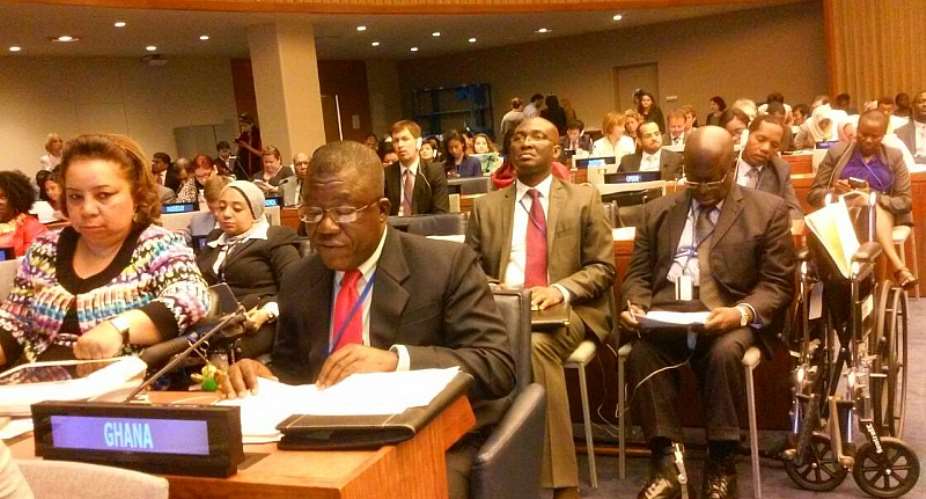Ghana has mainstreamed Persons with Disability (PWDs) into the National Social Protection Strategy and Poverty Reduction Interventions to enable them to develop their full potentials and participate in the national development process.
These are being backed with policies,programmes and strategies to facilitate the implementation of provisions in the Ghana's Persons with Disability law and the Convention on the Rights of Persons with Disability,
Ghana's Deputy Minister of Gender, Children and Social Protection, Alexander John Ackon announced this when he enumerated some of the measures taken by Ghana in his address at the 8th session of the Conference of States Parties to the Convention on The Rights of Persons with Disability(CRPD) at the United Nations headquarters in New York on Tuesday,(June 9, 2015).
The three-day Conference on "Mainstreaming the rights of persons with disabilities in the post-2015 development agenda", is taking stock of past achievements and looking ahead at strategies for the future. Ghana's delegation led by Mr.Ackon include Dr. E. Gyimah-Boadi,chair of National Council for Persons with Disability (NCPD) and Mrs. Getrude Oforiwa Fefoame, a NCPD member.
Various measures taken by the Ghana Government to create the right environment for the PWDs, he said included the allocation of two percent of the total national revenue under the District Assembly Common Fund to the most vulnerable among PWDs in the District, Municipal and Metropolitan Assemblies for beneficiaries to have access to education,healthcare, assistive devices and training and improvement of their businesses.
The Deputy Minister further announced that the disbursement of $1.5 million in 2013 under the Ghana Livelihood Empowerment Against Poverty (LEAP) to more than 23,814 PWDs to meet some of their basic needs.These beneficiaries have also been registered under the National Health Insurance Scheme to enable them to have free medical care.
The National Council for Persons with Disability (NCPD), he said had developed a mechanism to independently monitor the disbursement of the funds.
The Council also collaborates with the Ghana Investment Fund for Electronic Communications ( GIFEC) to implement a pilot Disability Employment Project including ICT training to offer decent employment to PWDs.
To address the challenge of exclusion of PWDs, particularly women and girl children in education, Mr. Ackon said PWDs in basic schools enjoy the same free basic education, apart from the government providing other facilities at the public universities to ensure positive education experience.
Other measures include providing ramps and lifts on public institutions, reading materials in accessible format with the help of the Braille tanslation centre of the Ghana Blind Union.
A registration of all PWDs in Ghana is being conducted by the NCPD to develop a credible data base to guide policy makers to design programmes specifically tailored to address the needs of PWDs in Ghana, Mr Ackon disclosed.
Despite various interventions to protect and promote the welfare of PWDs,the Deputy Minister noted that certain negative perceptions and beliefs persisted against disability and PWDs in the cultural arena, which the government is doing all it can to change.
Opening the conference earlier, the Deputy Secretary General Jan Eliasson appealed to the States Parties to give priority to addressing the vulnerability of persons with disabilities. and intensify efforts to support those facing multiple discrimination. This relates particularly to women and girls, disadvantaged youth, and older persons. The new vision for sustainable development should offer a framework for bold action,
"Even before the adoption of the new agenda, I encourage action by all Member States. Every country should make the right to inclusive education systems a reality for all students, including boys and girls with disabilities", he stated.
Mr Eliasson tasked the Conference to strengthen cooperation and partnerships adding that "Empowering persons with disabilities and securing their rights will advance society as a whole. Let us turn this landmark Convention into a reality for persons with disabilities. We should recall that the quality of a society is ultimately determined by how it deals with and treats its most vulnerable citizens".
The Convention on the Rights of Persons with Disabilities was adopted by the General Assembly by resolution 61/106 on December 13,2006. It came into force on May3, 2008 upon the 20th ratification. Article 40 of the Convention stipulates that “The States Parties shall meet regularly in a Conference of States Parties in order to consider any matter with regard to the implementation of the present Convention.” .





 We’ll no longer tolerate your empty, unwarranted attacks – TUC blasts Prof Adei
We’ll no longer tolerate your empty, unwarranted attacks – TUC blasts Prof Adei
 Bawumia donates GHc200,000 to support Madina fire victims
Bawumia donates GHc200,000 to support Madina fire victims
 IMF to disburse US$360million third tranche to Ghana without creditors MoU
IMF to disburse US$360million third tranche to Ghana without creditors MoU
 Truck owner share insights into train collision incident
Truck owner share insights into train collision incident
 Paramount chief of Bassare Traditional Area passes on
Paramount chief of Bassare Traditional Area passes on
 Two teachers in court over alleged illegal possession of BECE papers
Two teachers in court over alleged illegal possession of BECE papers
 Sunyani: Victim allegedly shot by traditional warriors appeals for justice
Sunyani: Victim allegedly shot by traditional warriors appeals for justice
 Mahama vows to scrap teacher licensure exams, review Free SHS policy
Mahama vows to scrap teacher licensure exams, review Free SHS policy
 Government will replace burnt Madina shops with a new three-story, 120-store fac...
Government will replace burnt Madina shops with a new three-story, 120-store fac...
